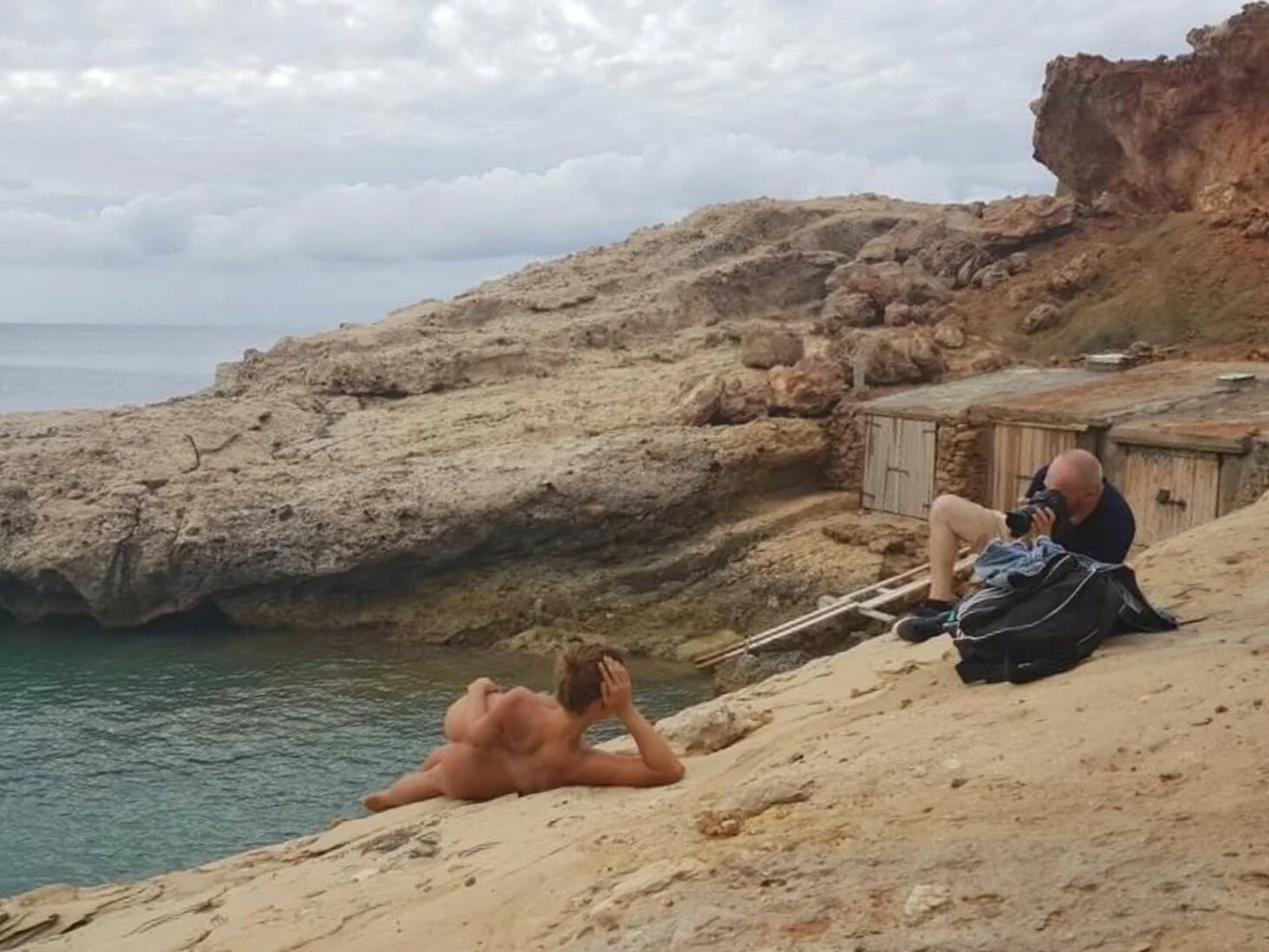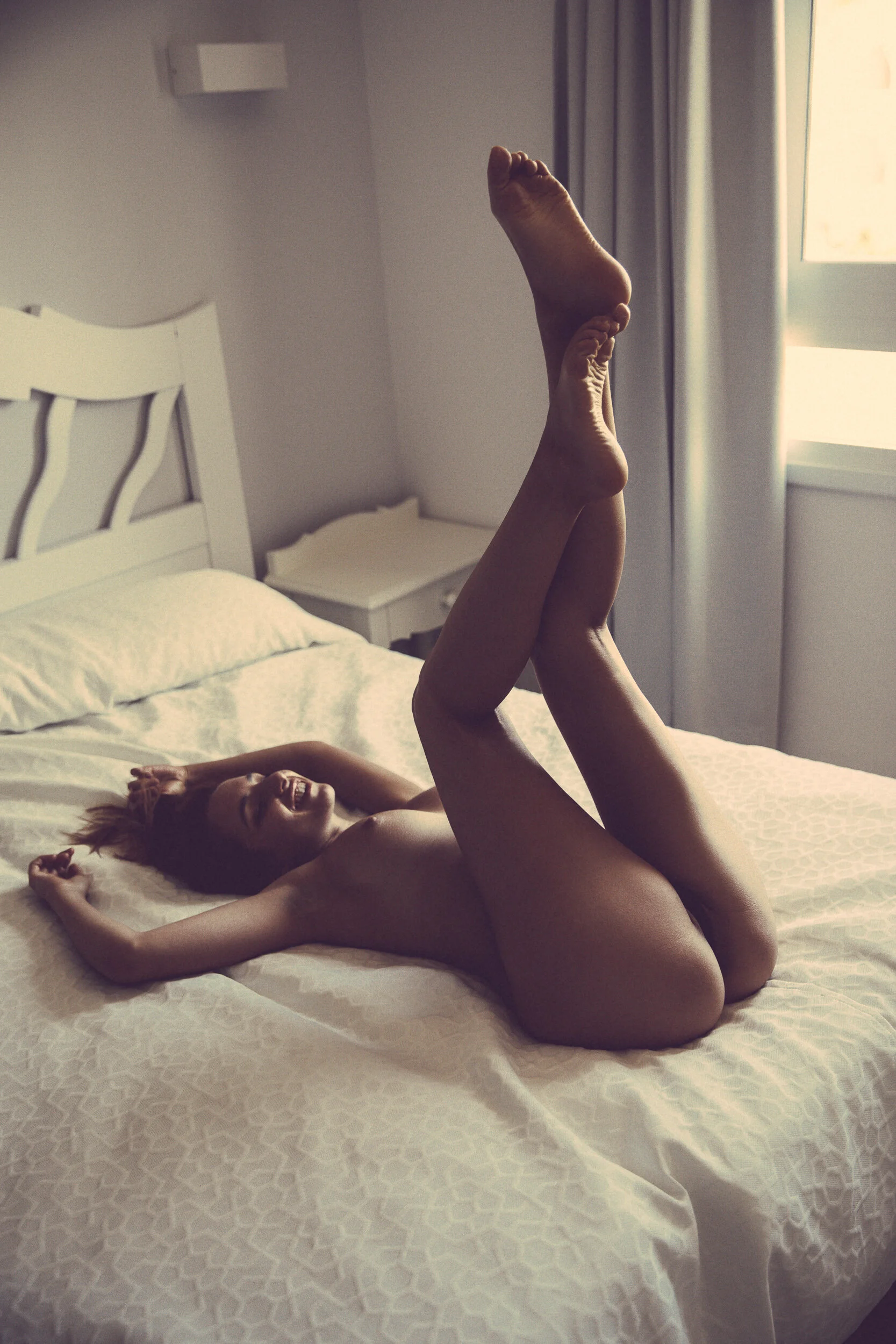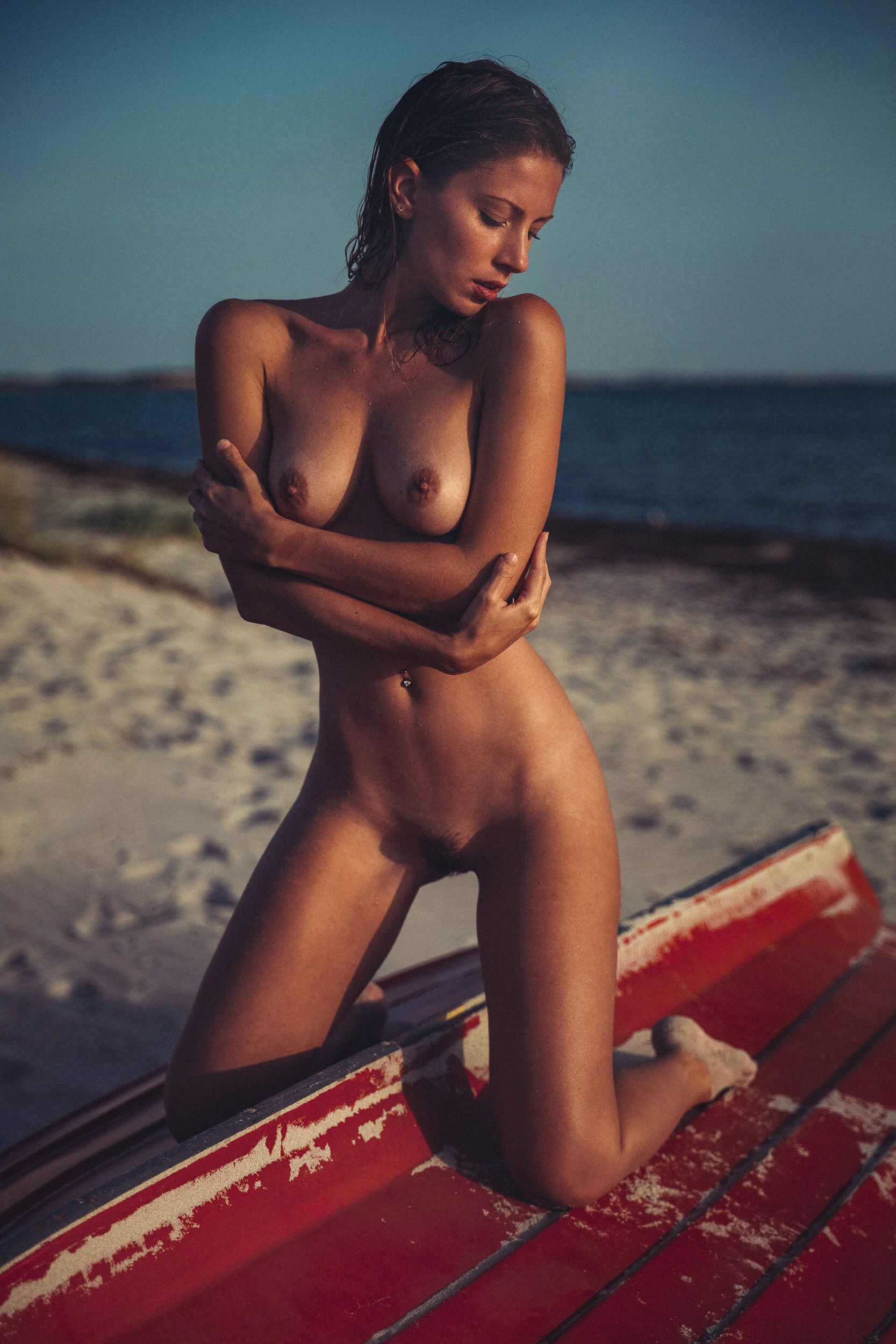"I would fail if you didn't consider my pictures being sexual". - The photographer Thomas Agatz in conversation with Thomas Berlin
Thomas Agatz
Thomas is a Danish photographer, shooting sexy girls for mens magazines. He is traveling all over Europe for shootings. We talked about his photographic approach, his work with models, how to shoot in harsh sunlight and about his workflow.
Image: Thomas shooting Marisa Papen at a nudist beach in Ibiza.
Thomas Berlin: Thomas, to use a common cliché: On which sunny beach was your last shooting?
Thomas Agatz: Last shooting that looks like a sunny beach was in July 2020, but it was actually in Como lake in Italy, with the French-Ethiopian model Maeva, but actually it was back in the late summer of 2019 at Spanish Menorca with Russian model Olga Kobzar. The Corona situation in 2020 have done, that I haven't been able to go on my normal trips to the Mediterranean islands.
Berlin: Ah, that's why I saw more indoor shoots from 2020 …
Agatz: … yes, in 2019 I had 9 trips to Spain plus several other places. More than 70 days out. In 2020 it's only been a few trips to Berlin, Prague, Bergamo and Florence, when it was possible in the summer months.
Berlin: Your pictures show beautiful and sexy young women having a good time. When I see your pictures, I think of summer mood, youth and well-being. But that's just my perception. What is the mood you are looking for?
Agatz: With your description, I can hear that I’m archiving my goals (laughs). What I’m looking for, is to show the woman I shoot as beautiful, independent, sexually charged, and with a lot of self esteem.
Model Maeva on lake Como, Italy.
Berlin: Why do you photograph people and not other subjects?
Agatz: I did actually at some point, but I'm a pretty socially strong person myself, so I like a lot more to create something with another human being, and that's actually how I see it: we are creating something together - it's not just me taking pictures of her. Besides that, the female body is one of the most beautiful things on this planet.
Berlin: When are you satisfied with your work?
Agatz: Oh, that’s a tough one. It's a feeling. Often I have to try a lot before I'm satisfied, but I definitely know 'when it's there'. I can feel it already when I'm looking through the viewfinder.
Berlin: How do you develop your ideas? Do you work with concepts or do you work spontaneously?
Agatz: It's very different. Sometimes I've planned a specific concept, other times I got some brief ideas, and then sometimes I'm just traveling around with a model with our eyes open for interesting locations.
Berlin: How long are you traveling with a model for a project? And what are you doing together when you are not shooting?
Agatz: It varies a lot. Some models are just stopping by for a few hours, and others I spend up to 5 days with. We're going out, sharing a pizza, taking a drink, singing stupidly together in the car on our way somewhere, talking a lot. Very often the connection becomes very close, and the talkings becomes very private and personal.
Berlin: Do your models have something in common? What are the requirements being your model? I can imagine that it is not only the beautiful body …
Agatz: If they do have something in common, then it's me finding them interesting and attractive. That's the strongest requirement. I need to have this feeling 'wow, she's amazing', no matter if it's her beauty, coolness or something else. I'm almost only working with full-time pro nude models, but it's not a requirement at all, it's just easier. I prefer models being as natural as possible. A few cool tattoos is ok, but I've said no thanks to a lot of amazing models because of too many tattoos or too unnatural boobs.
Berlin: You often work with the same model, like Marisa Papen. What is your way to build creative and long term partnerships with models? What should a photographer do and what should he or she avoid?
Agatz: The most important thing for archiving amazing nude pictures, is to be 'on the same page'. Having 100% trust. Basically no matter what I would ask a model to do (after we've spend some time together) she would do it, as if everything was normal, because she knows I would never ask her to do anything that wasn't because I got an idea about we can create something amazing with it.
It's very easy to tell from the pictures of any nude photographer if he/she archives that. Look at the model. Does she look like she's full of self esteem and in total balance, or does it look at bit stiff and awkward?
When I'm having models traveling to me for spending a weekend, then I'm usually starting with taking them out for a dinner at some cool cozy place. For building a relationship. Building a trust and understanding that's so important for the work and time we're going to do together. Several of the models I'm sharing a hotel-room with for days, and it's perfectly normal and cool, because it's a professional relationship. We are photographic partners and friends for the time we spend together.
What to avoid? Don't have a second agenda.
Marisa Papen, Ibiza 2019
Berlin: You know so many models. I would be interested to know whether they have common personality traits. And also whether people gain more self-confidence through modeling.
Agatz: I wouldn't say they got any common personalities. But, of course they all get some kind of kick out of creating great pictures of them. Some with an artistic view, some for kicking their self esteem, and some because they just love to make pictures of themself looking amazing nude.
Berlin: With your pictures you show happy nude female models in a very natural way. How can I imagine a photo shoot with you?
Agatz: I keep it very simple and real. By the way: I'm actually doing workshops for teaching photographers to do what I do. both showing, and talking a lot about perspectives and what's important. what to do, and what not to do.
Berlin: How much freedom do you give your models and how much directive is necessary?
Agatz: It depends a lot on what we're doing and who it is. If it's a small concept, then I'm directing quite some. Some models are just more self going in doing poses, and others needs a few more ideas to work from.
Berlin: What are you doing to prepare for a shoot?
Agatz: Sometimes I prepare quite a lot. Bought things for using in the shoot, like flour, flowers, shaving cream, paint or whatever idea I've had. Other times it's more briefly - but I'm never meeting with a model without having any sort of idea what to do with her.
Berlin: How many people are there on the set? And do you work with a MUA?
Agatz: In my earlier days, it was usually with both a MUA and a stylist. I did more fashion back then. Now, it's just me & the model, and sometimes my girlfriend is with me and helping me out as my assistant. She's doing an amazing job, and often gives me a lot of ideas.
Italian model Kosi Dina, Bergamo 2020. Kosi got covered in shaving cream mixed with water, which was the idea of Thomas girlfriend.
Berlin: Thomas, I have also some technical questions. You capture often moments in very strong sunlight. How do you handle these situations regarding light, shadows and contrasts? Do you use fill lights?
Agatz: I've stopped using reflectors. Some times in strong sunlight, I'm using a hot-shoe flash, for filling out shadows, e.g. in eyeholes. But it depends on the result I'm looking for. The picture of Kosi Dina (edit: covered in shaving cream) is shot in mid day sunlight in July in Italy, so it doesn't get much stronger than that. For this setup, the shadows where part of my idea, so it's just camera & lens, nothing else.
I'm using circular POL-filter (polarization) a lot for taking some of the harsh light out, and raise the shadows a bit. It's working a bit like your favorite sunglasses. Besides that, i'm basically always shooting my pictures pretty dark, often 1/2-1 stop below, because I don't want anything to be burned out. EXIF on this picture above is 1/2000, ISO 100 at 59mm on a 24-70 lens.
Berlin: You photograph digitally, don't you? No intentions to shoot on film?
Agatz: I'm grown up with film, from my childhood. Both my mother and father where a lot into photography, as a hobby. So I'm born with having a darkroom in our home.
Today, I would never go that way. I don't think I would archive anything, just make it all more complicated, less safe and expensive to myself. To me, the camera is nothing but a simple tool. I don't have any romantic feelings about analog photography. The camera to me, is what a hammer is to a carpenter. I need it for realizing my vision. If the camera in my iPhone was the best hammer, then I would use that.
Berlin: What's your digital workflow up to the final picture in a magazine?
Agatz: Typical day is, I'm shooting at some locations around Europe. I'm shooting RAW to 2 cards, just to be sure. After ending the shoot, I'll use my Macbook to copy the files to 2 different USB SSD drives. One of them is staying in my pocket if I'm leaving the hotel-room/villa/whatever, since I would hate to loose days of work.
When I get home, I'll copy the pictures to my RAID server which is cloud backed up, and then import them to Lightroom and start looking through the pictures. Before finally choosing anything, I'm usually playing around with colors. It helps me a lot to play with the colors, since I can see when the pictures will be strongest, and it'll help me in the process of choosing the final pictures to retouch. After that, I'm usually doing a basic clean-up in Photoshop on the RAW picture, only with light adjustments. After that, I'll fine tunes the colors on one of the pictures for the series, and save it as a preset, which I'll add to the rest of the pictures in the series. I like to create a series which have the same mood through, to make it to be it's own little story.
Berlin: Which cameras / lenses do you use often? Is there one favorite?
Agatz: I'm shooting on a Canon 5D mk4 with a 2 battery grip, usually with a Canon 24-70 f2.8 mk2 lens. It's a super solid setup that never fails no matter how bad I treat it with saltwater, sand or whatever, and always deliver razor sharp images. My favorite lens is probably Canon's 85mm f1.2 mk2. It's an old lens, but I just love to shoot with it in f1.2, because of the mood it creates with it's beautiful blurry background. But usually, I'm just too lazy for using it. It's just so much more flexible to shoot with a zoom lens.
At some point I'll probably switch to the new Canon R5 which looks amazing, but... It's just a hammer, and the 5D4 is an amazing hammer.
Berlin: How important is social media to your success and inspiration?
Agatz: Social medias is important for me, for networking with models and magazines. Earlier I used it a lot for getting inspiration, but it's really rare nowadays. Ideas can come from a lot of other things I see. I'm buying some magazines and books and can strongly recommend that. Seeing the pictures as they where meant to be shown, on big print is just sooo much stronger, then a tiny pic on Instagram with a fucked up censorship. I hate it. I hate how the American double ethic is ruining the business I'm in. They care a shit about you showing something artistic or beautiful. To them, you are just another fish in their ocean they can sell fishing nets to.
Berlin: How do you sell your work? What is the proportion of commissioned work and free artistic work?
Agatz: The amount of commissioned work is rather little, but I'm selling usage rights to a lot of the work I'm doing. But I'm in no way into this for the money, then I would shoot something very different. I'm into this, because I love it. Then I take it as a benefit when somebody wants to pay me for using what I'm doing, but I'm really stubborn in separating those 2 things, even it balances fine in the end of the day.
Berlin: So you are not living from photography. What do you do for a living?
Agatz: It's a very clear choice from me, not to be financial dependent of photography. I'm simply afraid of finding myself running around and shooting a lot of shit, just for making some money, and loose my life long love for photography. I'm working as sales manager, with major contracts, and got the understanding from my work about the other part of me, photography, which is needed since I'm traveling quite a lot from May until September.
Berlin: Which magazine as a buyer of your work is most important?
Agatz: Penthouse Magazine. I'm in most of their issues. They usually love what I'm doing.
Berlin: Nude photography is the essential part of your work. When and how did you start, and why?
Agatz: It's funny… 8-10 years ago I rejected doing nudes. I didn't want to be put in a box of doing that. But then, a few models from some major model agencies I had been shooting fashion with some times, pushed me, so I agreed in trying it out. They turned out to become spectacular at the time, so it didn't take a long time before my inbox was full of requests from a lot of amazingly beautiful models who wanted to be captured nude by me. I simply had to admit, that I was within shooting nude that and I had some special skills.
Berlin: If I saw a sexual undertone in your pictures, would that be a compliment for you or politically incorrect?
Agatz: I would feel myself failing if you didn't think of them as being sexual. I would feel I failed too, if you said you think I'm showing the woman cheap or pornish.
Berlin: Thomas, could you outline a bit more how you did get into photography as a youngster? And what is your professional education?
Agatz: As told previously, I'm pretty much born into it, with darkroom, and playing with my moms camera and various technics in the darkroom, of under and over lighting specific areas of the picture, which was what we had back then. In my teenage years, I took various photography classes, but left it for many years. I educated within sales at business school. But for some years I worked with desktop publishing, which have a lot of the same perspectives, in colors, building balance in pages, just like basic rules of photography.
What got me into it again, is actually on my mom. She saw me playing with her camera every time we where together, so out of nothing she bought be a basic DSLR Canon, and invited me on a photo trip to Italy. I haven't left photography since then.
Berlin: Can you tell me your best reason to do what you are doing?
Agatz: I love it way too much to even think about not doing it. It gives me so much on so many levels.
Berlin: Do you have interests besides photography?
Agatz: I love skiing, traveling, and being in the nature. I'm out walking in forest and wild life almost every day, since besides the exercise, it frees my mind and gives me perspective.
Berlin: Thank you so much for the interview. Maybe you want to say something else?
Agatz: Follow your own instincts. Don't listen too much to other peoples critics and advises. How can they advise you in what’s right for you? But be patient with your own development. It takes time to be good at something. As a skilled portrait photographer said: After the first 100.000 pictures, it starts to be ok.
You see more from Thomas Agatz on his website and on Instagram. Feedback is appreciated here.















